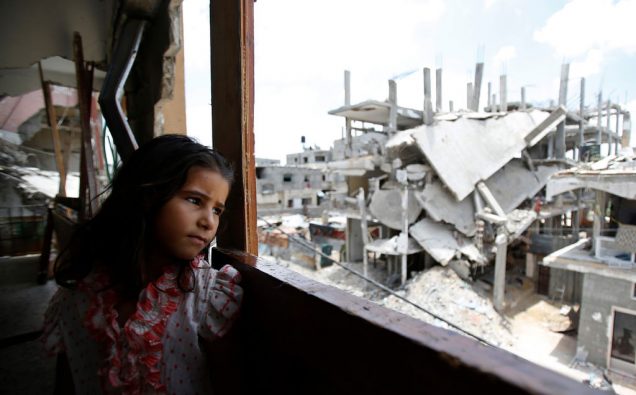
A Palestinian girl inside her family’s partially destroyed home, looks at the destruction outside, in the Shejaiya neighbourhood of Gaza City. Photo: UNICEF
Israel’s occupation in the West Bank and the blockade of Gaza are the primary cause for Palestinian “humanitarian needs,” a latest UN report says.
Titled Fragmented Lives (ochaopt.org/…/fragmented-lives-humanitarian-overview-2016) the report provides an overview of the underlying causes of humanitarian conditions in the occupied territories.
The report was issued by the Palestinian branch of the UN’s Office for the Coordination of Humanitarian Affairs (OCHA).
“Occupation policies and practices remain the key cause of humanitarian needs in the oPt [occupied Palestinian territory],” the report concluded.
David Carden, head of the OCHA in the occupied territories, attributed the hardship to a “pervasive” lack of protection and accountability for international law.
“At its heart, the crisis in the oPt [Occupied Palestinian Territory] is one of a lack of protection for Palestinian civilians – from violence, from displacement, from restrictions on access to services and livelihoods, and from other rights violations – with a disproportionate impact on the most vulnerable, children in particular,” he said in the 2016 humanitarian overview, Fragmented Lives.
The report raises several issues including the restriction on Palestinian movement and access to basic services.
Despite some easing of measures, OCHA noted that the number of Palestinians who Israeli officials allowed to leave Gaza had declined in the second half of 2016. The Rafah crossing – the sole crossing between Gaza and Egypt – was only opened for 44 days last year. While in the West Bank, OCHA recorded 572 movement obstacles, with an additional 110 obstacles in the Israeli-controlled Hebron city.
Israeli authorities in 2016 demolished or seized some 300 donor-funded structures provided as humanitarian aid to Palestinians, with a value estimated at more than $730,000, it says.
The report also noted the impact from the internal conflict among Palestinian politicians, with division between President Mahmud Abbas in the West Bank and Hamas in Gaza.
The “stringent” restrictions on movement and economic activities are also cited by the International Labor Organization (ILO), where the Director-General each year reviews the situation for workers in the West Bank, including East Jerusalem, and Gaza, Israel and the occupied Syrian Golan.
The 2017 edition of The situation of workers of the occupied Arab territories will be presented to the International Labor Conference in June.
Also, the report notes that while economic growth is taking place in West Bank and Gaza, it “is not enough to improve livelihoods, and it barely translates into employment gains.”
“The harsh reality facing all efforts to strengthen the Palestinian labour market is the control that the occupation exercises over the Palestinian borders and the access to land, water and natural resources,” ILO Director-General, Guy Ryder, says in his foreword to the report.
“The space for opportunities to work, farm, produce and create jobs in the occupied territories remains severely constrained,” Ryder said.
It says more than one-quarter of the Palestinian labor force is unemployed, rising to 40 per cent among young people.
The situation is “particularly dire” for the two million Palestinians living in Gaza, where 60 per cent of youth with school degrees are jobless, and where movement for work is next to impossible – further hampered by long waiting times and overcrowding at check points.
The report warns that as work prospects turn bleaker for Palestinian youth, the frustrations can fuel radicalization and violence.
Significantly, the report urges a “reanimation of the peace process with a view to achieving the two-state solution.”
“One of the aims of the Oslo agreements was to establish well-functioning labor markets for both Israel and the Palestinians. This remains little more than a distant aspiration,” Ryder said.


















